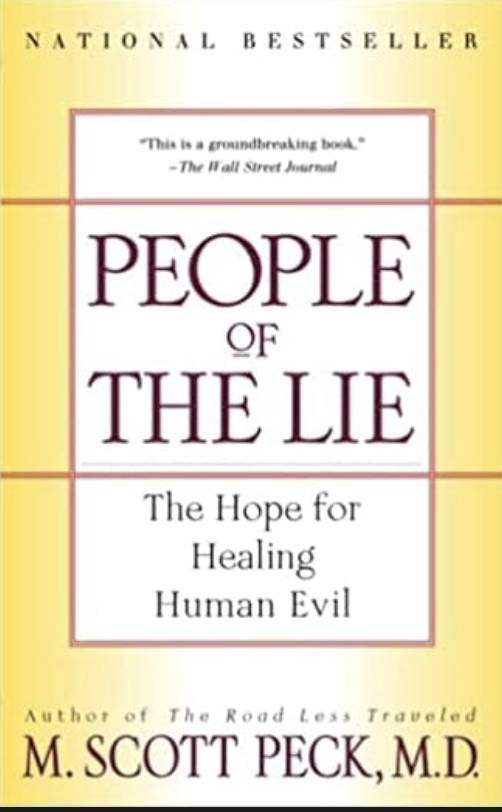
Living our lives, we often encounter situations where unexpectedly harsh treatment comes from seemingly ordinary and normal individuals. Whether it's betrayal or unjust accusations, sometimes the source of cruelty can be quite surprising. Additionally, there are cases where individuals who are overly diligent in their assigned tasks unexpectedly harm many people as a result.
Books have shed light on the fact that seemingly ordinary individuals can unexpectedly become agents of evil. One such book is "People of the Lie" by Scott Peck, a psychiatrist, which explores the psychological issues of evil individuals encountered in everyday life from the perspective of self-proclaimed evil psychology. Another is Hanna Arendt's "Eichmann in Jerusalem: A Report on the Banality of Evil," better known under the subtitle "Banality of Evil," which exposes how ordinary people, so seemingly inconspicuous, can cause great harm to society.
Dr. Scott Peck, also the author of the bestselling book "The Road Less Traveled," analyzes individuals who disrupt human relationships in everyday life and ultimately make the lives of those around them difficult or even bring them to ruin in his book "People of the Lie." Such individuals tend to hide their vulnerable or wounded egos formed during their developmental stages by setting up morally superior egos, cloaking themselves in self-righteousness, arrogance, and a sense of superiority. They often take on the guise of narcissists, judging or criticizing others based on their own ethical standards, and sometimes ridicule those who do not conform. They may even resort to manipulation and blame-shifting to protect themselves or to portray their flaws or wrongdoings onto others.
A common tactic that such individuals use is projection, which deflects one's own flaws onto others or blaming them for personal issues. This behavior, noted by Scott Peck, can cause significant distress to those affected, as detecting their intentions and truths isn't easy. Additionally, treating these individuals is often ineffective as they rarely acknowledge their own flaws, highlighting a dilemma in their lack of self-awareness.
Eichmann in Jerusalem, written by German philosopher Hannah Arendt, exposes the actions of Adolf Eichmann, a real historical figure, who was at the pinnacle of the Holocaust, responsible for the mass murder of millions of Jews under Nazi rule. Eichmann, as portrayed in the book, was simply a faithful bureaucrat who believed that faithfully following government directives, regardless of their purpose, was a sign of loyalty to the state and the duty of a bureaucrat. He functioned like a mere cog in a giant machine, devoid of any ethical consciousness or critical thinking, executing tasks as instructed without any consideration of the consequences. Stories like this may seem like someone else's problem, so people might just think, "Oh, it must be like that," and brush it off. However, when they directly encounter such people in their surroundings, they come to fully realize the hardship involved.
Arendt, who covered Eichmann's trial, where he showed no remorse, vividly demonstrates how ordinary people can unknowingly commit great evils. Looking around, one might realize that such individuals could be oneself or close colleagues at work. They could be conscientious professionals, obediently carrying out their duties, or even public officials such as soldiers or police officers.
These books highlight different types of evildoers but share commonalities. Firstly, evil isn't necessarily perpetrated by distant or inherently sinister deomon, but can emerge from ordinary individuals in everyday life, including oneself, often unknowingly causing harm to others. Secondly, both types of individuals lack self-reflection and self-awareness, unable to gauge the origins of their behavior or understand how it may negatively impact others. Personally, I've recently encountered an individual embodying a combination of these types – a dangerous mix of self-righteous narcissism and obedient conformity – resulting in significant irreparable repercussions and damages.
While everyone carries wounds and vulnerabilities, those trapped in the clutches of an entrenched ego may lose opportunities for growth and correction. Beyond this egoic entrenchment, societal factors like rigid thinking and dogma, as well as the idolization of absolutism, can contribute to evil.
Ultimately, Scott Peck suggests that the path to overcoming evil lies in reclaiming integrity through love, yet a more practical solution involves cultivating self-awareness, introspection, and empathy.
It's time to assess where one stands on the spectrum of good and evil and measure one's level of self-awareness.
(Tranlsated by ChatGPT 3.5)



 <창칼 34> 근테크를 얼마나 하시나요?
<창칼 34> 근테크를 얼마나 하시나요?
 첫번째 요리 이야기
첫번째 요리 이야기

https://a.co/d/6MIBGbH2. 예루살렘의 아이히만 (악의 평범성) by Anna Arendt (2006)
https://a.co/d/0KnZX89